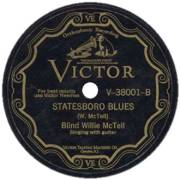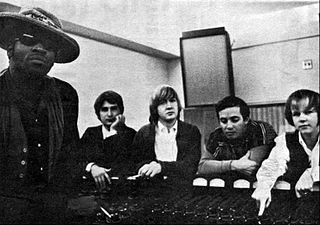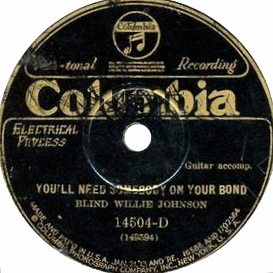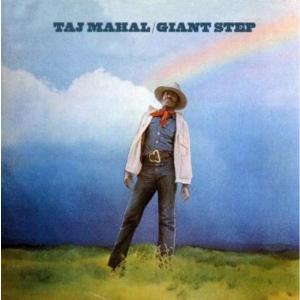
Slide guitar is a technique for playing the guitar that is often used in blues music. It involves playing a guitar while holding a hard object against the strings, creating the opportunity for glissando effects and deep vibratos that reflect characteristics of the human singing voice. It typically involves playing the guitar in the traditional position with the use of a slide fitted on one of the guitarist's fingers. The slide may be a metal or glass tube, such as the neck of a bottle. The term bottleneck was historically used to describe this type of playing. The strings are typically plucked while the slide is moved over the strings to change the pitch. The guitar may also be placed on the player's lap and played with a hand-held bar.

Ryland Peter Cooder is an American musician, songwriter, film score composer, record producer, and writer. He is a multi-instrumentalist but is best known for his slide guitar work, his interest in traditional music, and his collaborations with traditional musicians from many countries.

Henry St. Claire Fredericks Jr., better known by his stage name Taj Mahal, is an American blues musician and actor. He plays the guitar, piano, banjo, harmonica, and many other instruments, often incorporating elements of world music into his work. Mahal has done much to reshape the definition and scope of blues music over the course of his more than 50-year career by fusing it with nontraditional forms, including sounds from the Caribbean, Africa, India, Hawaii, and the South Pacific.

Blind Willie Johnson was an American gospel blues singer, guitarist and evangelist. His landmark recordings completed between 1927 and 1930—thirty songs in total—display a combination of powerful "chest voice" singing, slide guitar skills, and originality that has influenced generations of musicians. Even though Johnson's records sold well, as a street performer and preacher, he had little wealth in his lifetime. His life was poorly documented, but over time, music historians such as Samuel Charters have uncovered more about Johnson and his five recording sessions.

Crossroads is a 1986 American musical drama film inspired by the legend of blues musician Robert Johnson. Starring Ralph Macchio, Joe Seneca and Jami Gertz, the film was written by John Fusco and directed by Walter Hill and features an original score by Ry Cooder featuring classical guitar by William Kanengiser and harmonica by Sonny Terry. Steve Vai appears in the film as the devil's virtuosic guitar player in the climactic guitar duel.

"Statesboro Blues" is a Piedmont blues song written by Blind Willie McTell, who recorded it in 1928. The title refers to the town of Statesboro, Georgia. In 1968, Taj Mahal recorded a popular blues rock adaptation of the song with a prominent slide guitar part by Jesse Ed Davis. His rendition inspired a recording by the Allman Brothers Band, which is ranked number nine on Rolling Stone magazine's list of the "100 Greatest Guitar Songs of All Time". In 2005, the Atlanta Journal-Constitution ranked "Statesboro Blues" number 57 on its list of "100 Songs of the South".

Rising Sons was an American, Los Angeles, California-based blues rock and folk music band, which was founded in 1965. Their initial career was short-lived, but the group found retrospective fame for launching the careers of singer Taj Mahal and guitarist Ry Cooder.

"You'll Need Somebody on Your Bond" is a gospel song that is attributed to both tradition and to gospel blues musician Blind Willie Johnson. Johnson first recorded the song in December 1930, although Delta blues musician Charley Patton recorded a similar "You're Gonna Need Somebody When You Die" in October 1929. Over the years, several other musicians have recorded renditions of the song.

Best of the Blues Brothers is the fourth and final Blues Brothers album released before John Belushi's death in 1982. It is the first compilation album by the band and it was released by Atlantic Records on November 30, 1981. Along with tracks from the first three albums, Briefcase Full of Blues, The Blues Brothers: Music from the Soundtrack and Made in America, it includes unreleased live versions of "Everybody Needs Somebody to Love", "Rubber Biscuit", and a new song, "Expressway to Your Heart". The album was remixed by Steve Jordan and Donald “Duck” Dunn. Belushi’s wife, Judith Jacklin, designed the sleeve.

Taj Mahal is the debut album by American guitarist and vocalist Taj Mahal. Recorded in 1967, it contains blues songs by Sleepy John Estes, Robert Johnson, and Sonny Boy Williamson II reworked in contemporary blues- and folk-rock styles. Also included is Taj Mahal's adaptation of Blind Willie McTell's "Statesboro Blues", which inspired the popular Allman Brothers Band recording.

"It's Nobody's Fault but Mine" or "Nobody's Fault but Mine" is a song first recorded by gospel blues artist Blind Willie Johnson in 1927. It is a solo performance with Johnson singing and playing slide guitar. The song has been interpreted and recorded by numerous musicians in a variety of styles, including Led Zeppelin on their 1976 album Presence.

Giant Step/De Ole Folks at Home is the third studio album by American blues artist Taj Mahal. A double album, the first disc is electric, while the second is acoustic. Esquire included the album at number 27 on its list of "The 75 Albums Every Man Should Own".

In Progress & In Motion: 1965-1998 is a compilation album by American blues artist Taj Mahal, which was released in 1998.

Warm Your Heart is a 1991 album released by American R&B/soul singer Aaron Neville. It features the singles "Everybody Plays the Fool", "Somewhere, Somebody" and "Close Your Eyes". The "Close Your Eyes" single also featured album producer Linda Ronstadt on guest vocals. The pair had previously collaborated on the songs "Don't Know Much", "All My Life" and "When Something Is Wrong with My Baby".

"Dark Was the Night, Cold Was the Ground" is a gospel blues song written and performed by American musician Blind Willie Johnson and recorded in 1927. The song is primarily an instrumental featuring Johnson's self-taught bottleneck slide guitar and picking style accompanied by his vocalizations of humming and moaning. It has the distinction of being one of 27 samples of music included on the Voyager Golden Record, launched into space in 1977 to represent the diversity of life on Earth. The song has been highly praised and covered by numerous musicians and is featured on the soundtracks of several films.

The Complete Blind Willie Johnson is a compilation album of all the known recordings by American gospel blues singer-guitarist Blind Willie Johnson. As part of the Roots N' Blues series, it was released jointly by Columbia Records and Legacy Recordings, on April 27, 1993. All of the tracks on the two-compact disc set were originally issued by Columbia on the then-standard two-sided 78 rpm record format.

American Epic: The Best of Blind Willie Johnson is a compilation album released to accompany the award-winning American Epic documentary film series. It collects performances from Blind Willie Johnson's five recording sessions for Columbia Records in Dallas, Atlanta, and New Orleans between 1927 and 1930. The album was released as a 16-track download and a vinyl LP.

The Slide Area is the tenth studio album by Ry Cooder. It was released in 1982 and peaked at No. 105 on the Billboard 200.


















